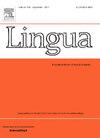我们对朋友骂人多还是对熟人骂人多?f# ck在社交网络
IF 1.3
3区 文学
0 LANGUAGE & LINGUISTICS
引用次数: 0
摘要
我们从社交媒体(Twitter/X)调查了fuck在数字社交网络中的使用情况。到目前为止,社交媒体主要被视为大量的文本集合,但它们可以有效地用于研究社交网络在塑造人类交流中的作用。我们使用来自5,660个社交网络(435,345个用户和78亿个单词)的用户生成文本,这些文本来自三个设置(英国、美国和澳大利亚)。通过嵌入网络信息,这个庞大的数据集使我们能够研究网络属性,即网络的大小和强度,如何影响这三种设置中攻击性词汇的使用。我们的研究结果显示,美国人使用fuck的频率最高,而澳大利亚人使用频率最低,但他们在拼写这个词的变体方面非常有创意。与之前的研究相反,我们观察到人们在这个社交媒体应用程序上对熟人比对朋友说脏话更多,但这只是在较小的网络中——在100人的较大网络中,差异趋于平缓。总的来说,这项研究强调了使用社交媒体数据的好处,这些数据可以被丰富,以允许访问人们互动的社交网络。本文章由计算机程序翻译,如有差异,请以英文原文为准。
Do we swear more with friends or with acquaintances? F#ck in social networks
We investigate the uses of fuck in digital social networks from social media, Twitter/X in this case. Social media outlets have so far been predominantly treated as massive text collections, but they can be effectively used to investigate the role of social networks in shaping human communication. We use user-generated texts from 5,660 social networks (with 435,345 users and 7.8 billion words) from three settings (UK, US, and Australia). With embedded network information, this massive dataset enables us to investigate how network properties, that of the size and the strength of the network, influence the use of offensive words in these three settings. Our findings show that Americans use fuck most frequently, while Australians least frequently but they are highly creative with spelling variants of the word. Contrary to prior studies, we observe that people on this social media application swear more with acquaintances than with friends, but only in smaller networks − in larger networks of >100 people, the differences level out. Overall, this study highlights the benefits of using social media data that can be enriched to allow access to the social networks that people interact in.
求助全文
通过发布文献求助,成功后即可免费获取论文全文。
去求助
来源期刊

Lingua
Multiple-
CiteScore
2.50
自引率
9.10%
发文量
93
审稿时长
24 weeks
期刊介绍:
Lingua publishes papers of any length, if justified, as well as review articles surveying developments in the various fields of linguistics, and occasional discussions. A considerable number of pages in each issue are devoted to critical book reviews. Lingua also publishes Lingua Franca articles consisting of provocative exchanges expressing strong opinions on central topics in linguistics; The Decade In articles which are educational articles offering the nonspecialist linguist an overview of a given area of study; and Taking up the Gauntlet special issues composed of a set number of papers examining one set of data and exploring whose theory offers the most insight with a minimal set of assumptions and a maximum of arguments.
 求助内容:
求助内容: 应助结果提醒方式:
应助结果提醒方式:


